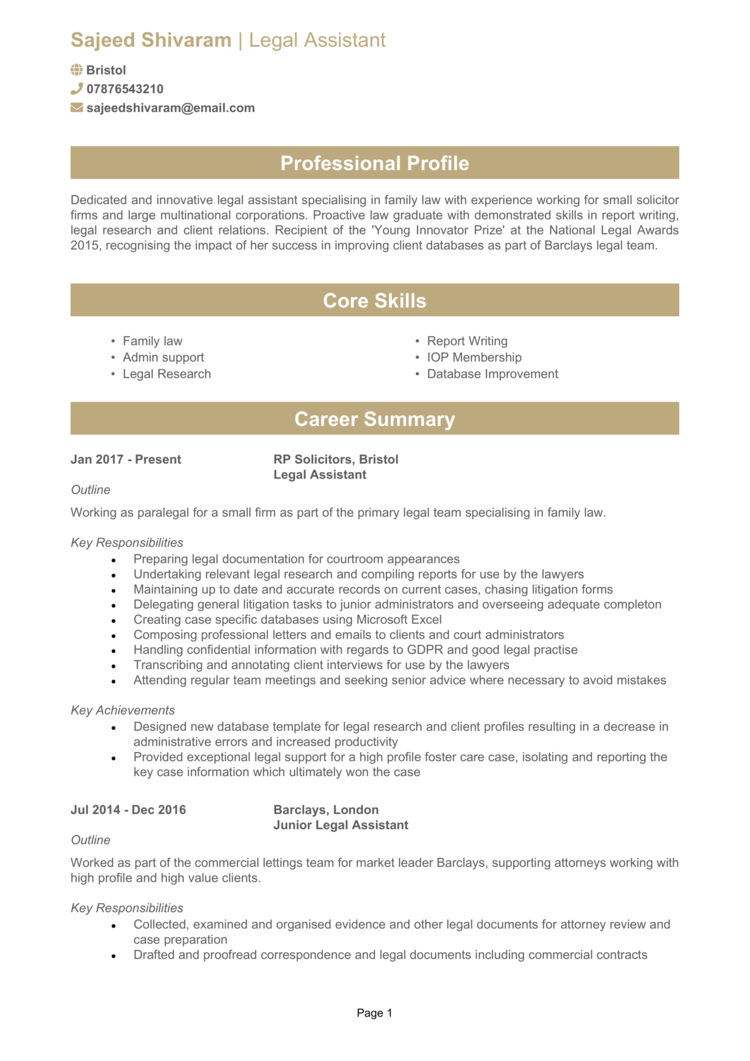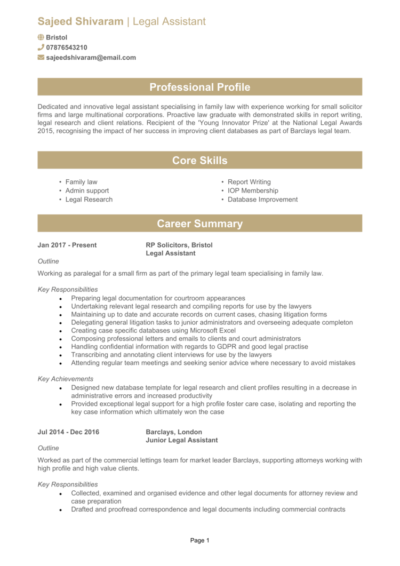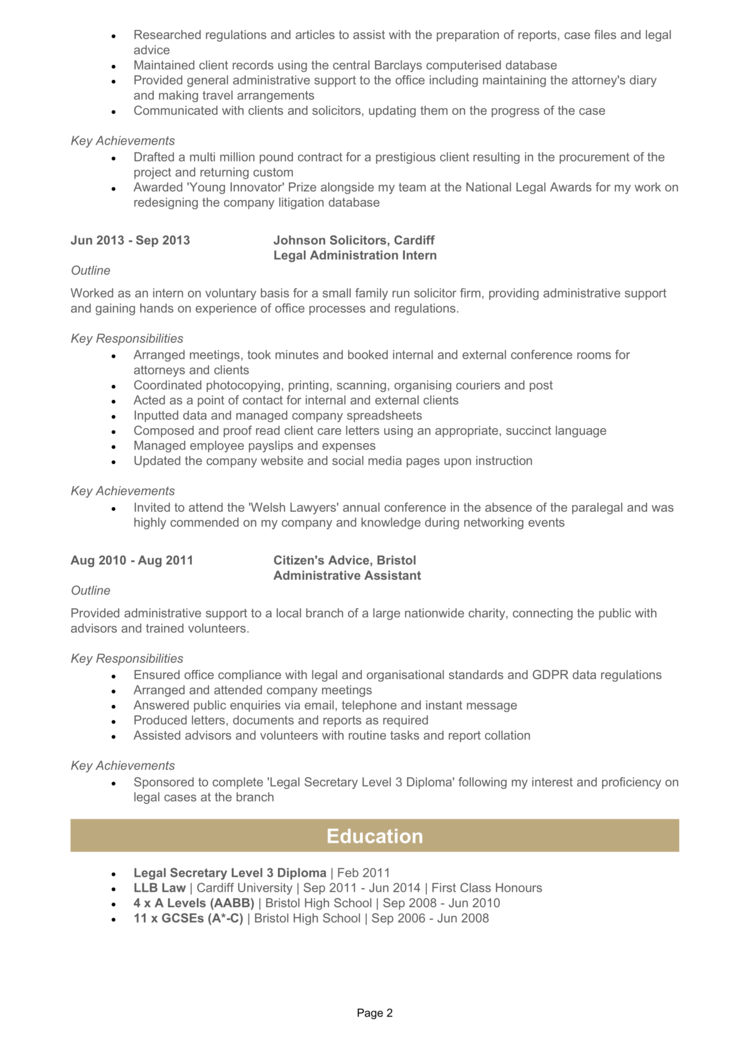As a legal assistant, you play a crucial role in supporting the lawyers in your firm. So, if you want to land this important position, you first need to build your case.
This means submitting an application that will capture the recruiter’s attention.
For a CV that helps you rise to the occasion, check out our legal assistant CV example, complete with our top tips and advice below.
|
Legal Assistant CV example

Unsure of what your Legal Assistant CV should look like?
Have a look at the CV example above to get familiar with the structure, layout and format of a professional CV.
As you can see, it provides plenty of relevant information about the applicant but is still very easy to read, and brief – which will please busy recruiters.


Legal Assistant CV layout and format
Think your CV is just about the content within it? Think again.
Your CV needs to look professional and be easy for recruiters to read, meaning the structure and format of your CV are just as important as the written content within it.
Facilitate ease of reading by using a simple structure which allows anybody to easily navigate your experience.
CV formatting tips
- Length: If you want to hold the reader’s attention and ensure your CV isn’t yawn-worthy, it’s best to stick to two sides of A4 or less. This is more than enough room to highlight why you’re a good match for the role – anything more can quickly become tedious!
- Readability: Recruiters appreciate CVs that they can quickly scan through without trouble. Ensure yours makes the cut by formatting your headings for attention (bold or coloured fonts should do the trick) and breaking up long paragraphs into smaller chunks or short, snappy bullet points.
- Design: While it’s okay to add your own spin to your CV, avoid overdoing the design. If you go for something elaborate, you might end up frustrating recruiters who, above anything, value simplicity and clarity.
- Avoid photos: Recruiters can’t factor in appearance, gender or race into the recruitment process, so a profile photo is totally unnecessary. Additionally, company logos or images won’t add any value to your application, so you’re better off saving the space to showcase your experience instead.
Quick tip: Formatting your CV to look professional can be difficult and time-consuming when using Microsoft Word or Google Docs. If you want to create an attractive CV quickly, try our quick-and-easy CV Builder and use one of their eye-catching professional CV templates.
CV structure
For easy reading, write your CV to the following CV structure:
- Contact details – Make it easy for recruiters to get in touch with you by listing your contact details at the top of your CV.
- Profile – A short and snappy summary of your experience and skills, showcasing what makes you a good fit for the position.
- Work experience / career history – Note down all your work history, with your current position first, then working backwards.
- Education – A short list of your academic background and professional/vocational qualifications.
- Interest and hobbies – This is an optional section, which you can use to highlight any relevant hobbies or interests.
Now I’ll tell you exactly what you should include in each CV section.
CV Contact Details
Make it easy for recruiters to get in touch, by heading your CV with your contact details.
There’s no need for excessive details – just list the basics:
- Mobile number
- Email address – Use a professional address with no nicknames.
- Location – Just write your general location, such as ‘London’ or ‘Cardiff’ – there’s no need to put your full address.
- LinkedIn profile or portfolio URL
Legal Assistant CV Profile
Recruiters and hiring managers are busy, so it’s essential to catch their attention from the get-go.
A strong introductory profile (or personal statement, for junior candidates) at the top of the CV is the first thing they’ll read, so it’s a great chance to make an impression.
It should be a short but punchy summary of your key skills, relevant experience and accomplishments.
Ultimately, it should explain why you’re a great fit for the role you’re applying for and inspire recruiters to read the rest of your CV.
Tips for creating an strong CV profile:
- Keep it concise: The best CV profiles are short, sharp and highly relevant to the target role. For this reason, it’s best to write 3-4 lines of high-level information, as anything over might be missed.
- Tailor it: No matter how much time you put into your CV profile, it won’t impress if it’s irrelevant to the role you’re applying for. Before you start writing, make a list of the skills, knowledge and experience your target employer is looking for. Then, make sure to mention them in your CV profile and throughout the rest of your application.
- Don’t add an objective: Want to talk about your career goals and objectives? While the profile may seem like a good space to do so, they’re actually much better suited to your cover letter.
- Avoid cliches: If there’s one thing that’ll annoy a recruiter, it’s a clichè-packed CV. Focus on showcasing your hard skills, experience and the results you’ve gained in previous roles, which will impress recruiters far more.
Example CV profile for Legal Assistant
What to include in your Legal Assistant CV profile?
- Summary of experience: Start with a brief summary of your relevant experience so far. How many years experience do you have? What type of companies have you worked for? What industries/sectors have you worked in? What are your specialisms?
- Relevant skills: Employers need to know what skills you can bring to their organisation, and ideally they want to see skills that match their job vacancy. So, research your target roles thoroughly and add the most important Legal Assistant skills to your profile.
- Essential qualifications: If you have any qualifications which are highly relevant to Legal Assistant jobs, then highlight them in your profile so that employers do not miss them.
Quick tip: Struggling to write a powerful profile? Choose from hundreds of pre-written profiles across all industries, and add one to your CV with one click in our quick-and-easy CV Builder. All written by recruitment experts and easily tailored to suit your unique skillset.
Core skills section
In addition to your CV profile, your core skills section provides an easily digestible snapshot of your skills – perfect for grabbing the attention of busy hiring managers.
As Legal Assistant jobs might receive a huge pile of applications, this is a great way to stand out and show off your suitability for the role.
It should be made up of 2-3 columns of bullet points and be made up of skills that are highly relevant to the jobs you are targeting.
Top skills for your Legal Assistant CV
Family law – highlighting specific areas of expertise or interest.
Report writing – writing detailed reports which explain the legal and factual issues in a case, and its likely outcomes.
Admin support – completing administrative duties such as greeting visitors, answering phones, communicating with solicitors, conducting legal research, drafting legal documents, and managing schedules.
Legal research – identifying and finding the laws that apply to the facts of a case in support of a specific legal issue or decision.
Database management – gathering, organising, securing, and storing a law firm’s data so it can be reviewed for legal and business decisions.
Quick tip: Our quick-and-easy CV Builder contains thousands of in-demand skills for every profession that can be added to your CV in seconds – saving you time and greatly improving your chances of landing job interviews.


Work experience/Career history
Now that recruiters have a good overview of your skills and abilities, you need to jump into the detail of your career history.
Give them a more thorough insight into what you can do by creating a detailed list of your relevant experience.
Start with your current role, and work backwards through all the relevant positions you’ve held.
This could be freelance, contract or voluntary work too; as long as it’s related to the role you’re applying for.
Structuring your roles
If you don’t pay attention to the structure of your career history section, it could quickly become bulky and overwhelming.
Get in recruiters’ good books by creating a pleasant reading experience, using the 3-step structure below:
Outline
Start with a solid introduction to your role as a whole, in order to build some context.
Explain the nature of the organisation you worked for, the size of the team you were part of, who you reported to and what the overarching purpose of your job was.
Key responsibilities
Next up, you should write a short list of your day-to-day duties within the job.
Recruiters are most interested in your sector-specific skills and knowledge, so highlight these wherever possible.
Key achievements
Round up each role by listing 1-3 key achievements, accomplishments or results.
Wherever possible, quantify them using hard facts and figures, as this really helps to prove your value.
Example job for Legal Assistant CV
Outline
Working as paralegal for a small firm as part of the primary legal team specialising in family law.
Key Responsibilities
- Preparing legal documentation for courtroom appearances
- Undertaking relevant legal research and compiling reports for use by the lawyers
- Maintaining up to date and accurate records on current cases, chasing litigation forms
- Delegating general litigation tasks to junior administrators and overseeing adequate completion
Quick tip: Create impressive job descriptions easily in our quick-and-easy CV Builder by adding pre-written job phrases for every industry and career stage.
Education section
Although there should be mentions of your highest and most relevant qualifications earlier on in your CV, save your exhaustive list of qualifications for the bottom.
If you’re an experienced candidate, simply include the qualifications that are highly relevant to Legal Assistant roles.
However, less experienced candidates can provide a more thorough list of qualifications, including A-Levels and GCSEs.
You can also dedicate more space to your degree, discussing relevant exams, assignments and modules in more detail, if your target employers consider them to be important.
Interests and hobbies
The hobbies and interests CV section isn’t mandatory, so don’t worry if you’re out of room by this point.
However, if you have an interesting hobby, or an interest that could make you seem more suitable for the role, then certainly think about adding.
Be careful what you include though… Only consider hobbies that exhibit skills that are required for roles as a Legal Assistant, or transferable workplace skills.
There is never any need to tell employers that you like to watch TV and eat out.


Writing your Legal Assistant CV
When putting together your Legal Assistant CV, there are a few key points to remember
Always tailor your CV to the target role, even if it means creating several versions for different roles.
Additionally, remember that the structure and format of your CV needs just as much attention as the content.
Good luck with your job search!










